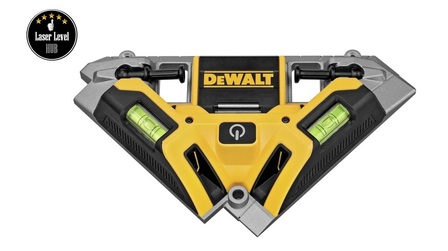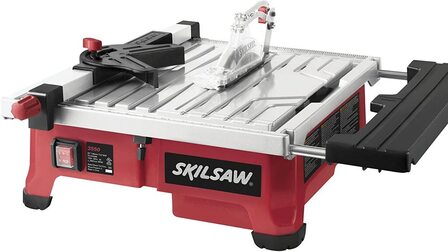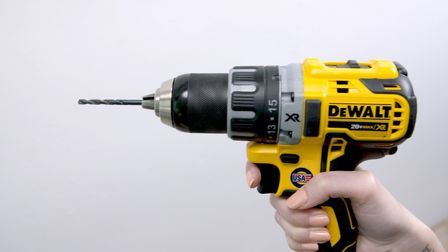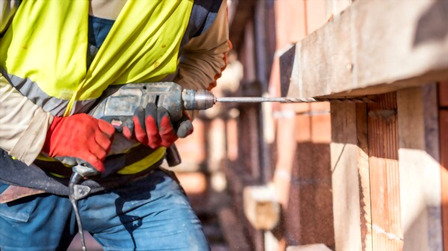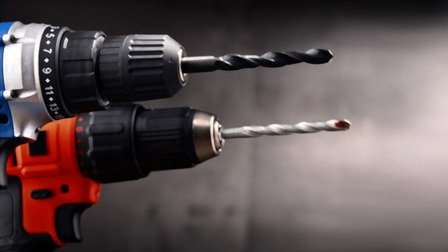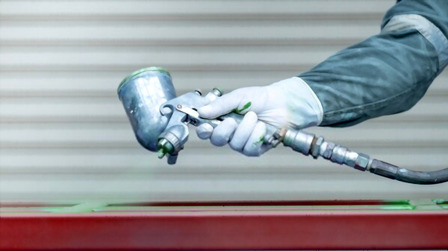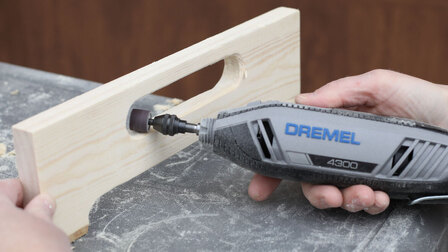Rotary tool accessories vary in sizes, shape, and design.
Accessories help us complete various tasks like cutting, sanding, polishing, and grinding with precision and accuracy.
They include bits and attachments among other assorted accessories.
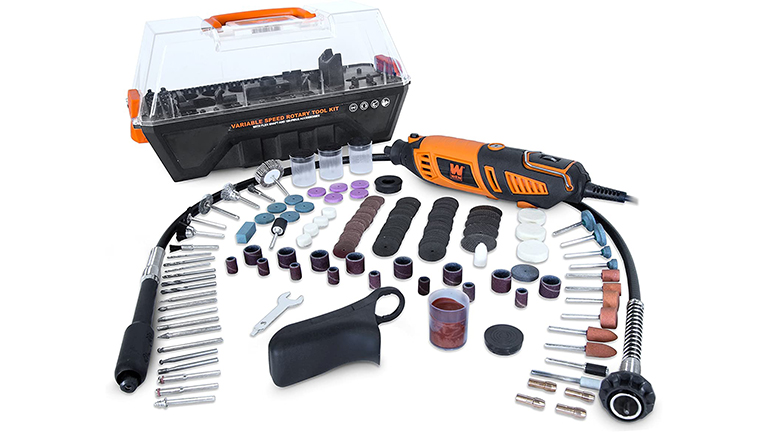
In this rotary tool accessory guide, I will help you understand these accessories, their applications, and offer some tips on how to best put them to use.
| Best Rotary Tool Accessories | ||
|---|---|---|
Right Angle | Dremel 575 Right Angle Attachment
| |
For Detailed Uses | Dremel Flex Shaft Attachment
| |
For Sharpening | Dremel A679-02 Attachment Kit
| |
For Cutting | Dremel 565 Multi-Purpose Cutting Kit
| |
For Wood Cutting | Dremel 670 Mini Saw
| |
Mini Router | Dremel 335-01 Plunge Router
| |
For Carving | Dremel 689-01 Carving and Engraving Kit
| |
For Cutting | Dremel EZ406-02 Cutting Discs
| |
Rotary Tool Attachments
Rotary tool attachments help us best use our rotary tool accessories. They include all these attachments that we incorporate into our rotary tools for flexibility, precision, and accuracy.
They can be broken down into four categories.
A) Ease of Reach Attachments
1 - Right Angle Attachments
 Dremel 575 Right Angle Attachment for Rotary Tool
Dremel 575 Right Angle Attachment for Rotary ToolThe right angle rotary tool attachment is designed to use accessories at a right angle. It helps you work on hard to reach areas like corners and inside the cabinets during remodeling tasks.
It has been designed with a coupling system that allows you to rotate it in 12 different directions on your rotary tool.
Tips for Effective Use:
The Right-Angle attachment can be used when drilling holes, sanding, cutting, and grinding.
All you need is to attach it to your rotary tool and then fix an accessory. Depending on your rotary tool, you may need a wrench during the exercise.

This attachment is best used with the drill bits and sanding drums.
You may need to drill into hard to reach areas like inside permanent cabinets or sand them before repainting.
With this attachment, all you need is the right bits or sanders and you are good to go.
2 - Flexibility Shaft Attachments
 Dremel 225-01 Flex Shaft Attachment
Dremel 225-01 Flex Shaft AttachmentThe flexibility shaft attachments are ideal for people who use rotary tools for detailed workthat needs precision. Such tasks like wood carving, glass engraving, etching, and jewelry polishing need accuracy and precision.
With the Flex-Shaft attachment, you will easily get such tasks done, thanks to the comfortable grip that offers a better control.
Tips for Effective Use:
Using the Flexibility Shaft attachment is pretty easy.
All you need is to attach it to your rotary tool and then fix the right accessory. Depending on your rotary tool, you may need a wrench.
Never bend the flex-shaft while it is in use.
Inside the shaft, there is a rotating mechanism that helps in transmitting the rotary power from the rotary tool to the flex-shaft tool control.
 Dremel 225-01 Flex Shaft Attachment
Dremel 225-01 Flex Shaft AttachmentNonetheless, you should securely place the rotary tool on a clamp or hook it on the wall while using the flex-shaft control.
Ensure that the rotary tool is above the flex-shaft attachment for better performance.
B) Sharpening Attachments
Sharpening Kit Attachment For Chainsaw, Lawn Mower and Gardening Tools
Sharpening your chainsaw or gardening tools has never been easy.
This attachment comes as a kit with three grinding stones, adjustment gauge, and an angle guide. The attachment helps you sharpen your tool blades faster and easier.
 Dremel A679-02 Attachment Kit for Sharpening Outdoor Gardening Tools
Dremel A679-02 Attachment Kit for Sharpening Outdoor Gardening ToolsTips for Effective Use:
Always start by determining the grinding stone that you will be using.
The three grinding stones will help you achieve different results when sharpening. Attach it to the rotary tool before fixing the angle guide and adjustment gauge.
The sharpening process produces a lot of sparks. You will need to wear eye protection gear like goggles and gloves. Your regular sunglasses will still suffice the need.
Learn how to sharpen a chainsaw using a rotary tool with this attachment kit:
C) Cutting Attachments
1 - Wall Tile Cutting Kit
The wall-tile cutting kits feature an adjustable cutting guide and one tile cutting bit. It offers for controlled cutting on ceramic wall tiles.
The cutting guide can be adjusted to 19 mm (0.75 inch) in depth (tile thickness).

In case you desire to put some fixtures on your bathroom walls, you will most likely need to cut into the wall tiles.
The wall tile cutting attachment is the right accessory for this job, since it offers for better cutting with precision and accuracy.
Tips for Effective Use:
Avoid using the bit on floor ceramic tiles. However, you can use the adjustable guide with a floor bit when cutting floor ceramic tiles.
The kit easily attaches to your rotary tool. Depending on your tool, you may need a wrench in the process.
Moreover, always remember to adjust the depth before working on your tiles to avoid cutting into other fixtures.
2 - Multipurpose Cutting Kit
The multipurpose cutting kit attachment offers for controlled cutting in various materials like ceramic tiles, vinyl siding, wood, plywood, fiberglass, and drywall.
 Dremel 565 Multi-Purpose Cutting Kit
Dremel 565 Multi-Purpose Cutting KitThe kit comes with a cutting guide and cutting bits. Moreover, it offers for easy depth adjustment that can go up to about 19 mm in material thickness.
The cutting guide is similar to that of wall-tile cutting kit.
Tips for Effective Use:
All you need is to fix the cutting bit on your rotary tool and then attach the cutting guide to use the kit. You can easily adjust the cutting depth without the need for other tools.
I would advise that you try the kit on scrap material like ceramic tiles and wood before using it on your walls or floor.
This way, you will understand how deep you need to adjust the guide for accurate cutting.
3 - Wall & Floor Grout Removal Kit
The Grout Removal kit attachment helps you remove grout between wall and floor tiles during a remodeling exercise.
It reduces the risks of chipping your tiles that would have occurred in case you relied on manual chiseling.

The kit comes with an adjustable guide that has a slanting base.
This base design helps you put your rotary tool into use while at the same time have a clear view of the surface that you are working on. Hence, making mistakes like cutting into your tiles is easily avoidable.
Tips for Effective Use:
You only need to fix the grout removal bit and then attach the guiding attachment in order to use the tool.
The guide keeps the bit centered between the tiles while offering for easy adjustment.

Working on tiles with the grout removal bit is an exercise that produces a lot of dust. Hence, you will need eye protection gear like sunglasses and gloves.
4 - Mini Saw Attachment Kit
 Dremel 670 Mini Saw Attachment
Dremel 670 Mini Saw AttachmentThe Mini Saw Kit features a mini-saw attachment, driver cap, and rip/crosscut blade. This attachment will transform your rotary tool into a precision circular saw cutter.
You can use it when making clear, straight, and fine cuts in all sorts of wood and laminate.
The only drawback of this attachment is the fact that it can’t be used to make deep cuts.
Tips for Effective Use:
All you need is to attach the mini saw attachment on your rotary tool and then fix the Rip/Cross-Cut Blade and driver cap. It can be done with the help of a wrench for a tighter grip.

To make deep straight cuts, consider using this mini-saw attachment to make a straight, precise cut. Then, you can use a larger cutting disc without the attachment to complete the final cut.
D) Routing Attachments
1 - Plunge Router Attachment
The Plunge Router attachment easily converts your rotary tool to a plunge router. Its clear base helps you see what is happening on the work surface.
 Dremel 335-01 Plunge Router Attachment
Dremel 335-01 Plunge Router AttachmentThis attachment comes as a kit that includes a plunge router, circle guide, edge guide, wrench, and guide bushing set.
With it, you can rout inlay work, signs, decorative edges, and circles.
Tips for Effective Use:
Fix your rotary tool on the plunge router attachment and securely lock it in place. The attachment accepts most of the corded rotary tools.
To unlock or lock it in place, simply turn the handle.

Depending on the type of routing that you need to accomplish, you may need the circle guide or edge guide. You will also need to adjust the routing depth as per your desire.
2 - Shaper/Router Table
What is the easiest way to convert your rotary tool into a bench mounted tool?
Well, Shaper/Router table!
With it, you can manage to precisely sand, groove, shape, and route items that are either irregularly or conventionally shaped.
 Dremel 231 Shaper/Router Table
Dremel 231 Shaper/Router TableTips for Effective Use:
Always begin by inserting the accessories before fixing the router table attachment. You may need a wrench in the process.
The 3-way adjustable fence helps you get accurate results. The rotary tool will move back and forth on the bench as you work on your desired surface.
Rotary Tools Bits
Rotary tool bits can be classified into two main categories. These are carving/engraving and cutting/drilling bits.
A) Carving/Engraving Bits
Carving and engraving bits feature tungsten carbide high-speed cutters and diamond bits. They come in different shapes, sizes, and designs.
 Dremel 689-01 11-Piece Rotary Tool Carving and Engraving Kit
Dremel 689-01 11-Piece Rotary Tool Carving and Engraving KitThe diamond bits are used when engraving on glass, steel, ceramic tiles, and mirror, while high-speed cutters are mostly used when carving on wood, book board, clay, and plywood.
Cutter bits are ideal when using your rotary tool for wood carving since they have coarse surfaces.
Tips for Effective Use:
- Engraving on glass
When engraving on glass, you will start by working with the tiny-headed diamond bits to trace the outline.
You can later use the larger bits to fill in the patterns and letters. Engraving high-speed cutters can also be used when creating the outline where tracing isn’t needed.
- Carving on wood
Similarly, start by using the sharp high-speed cutters to create the carving outline on wood. Later, fill in with the big-headed bits.
Tungsten carbide cutter bits and structured tooth tungsten carbide cutters can be used when smoothening wooden surfaces and edges during engraving exercises.
B) Cutting/Drilling Bits
 Dremel 628-01 7 Piece Drill Bit Set
Dremel 628-01 7 Piece Drill Bit SetCutting bits come with threads that mimic the traditional drill bits. They are mainly used when cutting into ceramic tiles, drywall, and laminate.
However, they can still be used on wood, fiberglass, aluminum, and plastic.
The cutting bits can also be used to drill holes on these materials. However, there are special drill bits that have been designed to best serve the purpose.
Tips for Effective Use:
These bits are made of high-speed stainless steel. Hence, they can't be used to cut or drill into hard metallic surfaces.
All you need is your rotary tool and the right bit. Use a wrench to fix the bit in place and you are ready to put it into use!
Rotary Tool Accessories
Rotary tool accessories are all the assorted accessories that help you put your rotary tool to use. They include the sanders, polishers, cutting discs, and grinding stones.
I would say they are anything else that isn’t a bit nor an attachment.
A) Sanding Accessories
 McKay Abrasive 51 Pc Sanding Drum Set
McKay Abrasive 51 Pc Sanding Drum SetSanding accessories feature two parts. These are the sanding bands and sanding drums.
The drums hold the sanding bands in place. Sanding bands come in various grits just like the traditional sandpaper sheets.
Sanders can be used on wood, book board, aluminum, polymer clay, pets’ toes nails, and plexiglass.
Tips for Effective Use:
To use the sanding accessory, simply slide a sanding band of your desired grit on the sanding drum. Then, attach it to the rotary tool and slowly work on the surface.
Sanding bands and drums come in various sizes. The smaller are ideal for precision sanding like wooden door knobs, while the larger are ideal for niche sanding or larger surfaces like cabinet doors.
Always remember to replace the sanding bands when they wear out. It is pretty easy, pulling it out of the drum and fixing a new band.
B) Grinding Stone Accessories
 Happy E-life Rotary Tool Grinding Stone Set
Happy E-life Rotary Tool Grinding Stone SetGrinding or sharpening stones look like the sanding accessories on the first glance. However, unlike the sanders, grinding stones come as a whole accessory.
The accessory features a grinding stone that has been permanently attached to an arbor that you will use when fixing the rotary tool.
Grinding stones are either made of silicon carbide or aluminum oxide and come in different sizes and shapes.
Tips for Effective Use:
The aluminum oxide grinding stones come in brown, grey, pink, or orange colors. These stones can either be used on steel, ceramic, mirror, or glass.
Thus, if you need to sharpen knives consider using the aluminum oxide grinding stones.
On the other hand, silicon carbide stones are green in color. These stones aren't as strong as aluminum oxide grinding stones.
Hence, they are mainly used when sharpening mirror, glass, and aluminum. You will need to rotate them in medium speeds for better results.
When they wear out after a consistent period of use, consider reshaping them with a dressing stone for better performance.
C) Cutting Wheels/Discs Accessories
 Dremel EZ406-02 Rotary Tool Cut-Off Wheel
Dremel EZ406-02 Rotary Tool Cut-Off WheelJust like the name suggests, cutting discs feature wheel-shaped accessories that are used when cutting into different materials when rotated at very high speeds.
These discs are made of different materials and intended to be used on different surfaces.
Cutting discs also come in different sizes in diameters with the cut-off wheels being the smallest while the carbide wheels the largest.
Tips for Effective Use:
To use a cutting wheel, you will need to attach it to a mandrel. The process is pretty easy, whereby you only need to screw it on the mandrel and then attach it to your rotary tool.
The most common are abrasive carbide cutting wheels. They can be used when cutting wood, plexiglass, and book board. They are either brown or grey in color.
Avoid using abrasive wheels on hard surfaces like metals.
Fiberglass cutting wheels are much stronger and can be used on ceramic tiles, aluminum, and wood.
Different manufacturers have improvised stronger multipurpose cutting wheels that can be used on a wide array of materials including metals.
Cut-off wheels are the smallest, yet strongest. They can be used on metallic surfaces like steel sheets, nails, and iron-sheets.
D) Cleaning/Polishing Accessories
 PHYHOO Wool Felt Mounted Mandrel Head Polishing Buffing Bits
PHYHOO Wool Felt Mounted Mandrel Head Polishing Buffing Bits Closing the list are cleaning and polishing accessories.
They feature a mandrel/arbor and polishing felts. These felt come in different sizes and shapes, not mentioning that they are made of different materials.
Some feature brass or stainless-steel brushes that have been permanently fixed on the arbor. These varieties are ideal for cleaning metallic surfaces.
Tips for Effective Use:
Attach the polishing felt on a mandrel. You will need to screw the mandrel into the polishing felt/wheel for a tighter grip.
Depending on the type of the polishing/cleaning felts, they can be used on mirrors, silver, jewelry, glass, ceramic tiles, and aluminum.
Bottom-Line
Different manufacturers have designed their rotary tool accessories in different ways.
However, most of them can be used on a large number of the rotary tools in the market today. They might differ in shape or color, but will still fit on your tool and serve the intended purpose.

